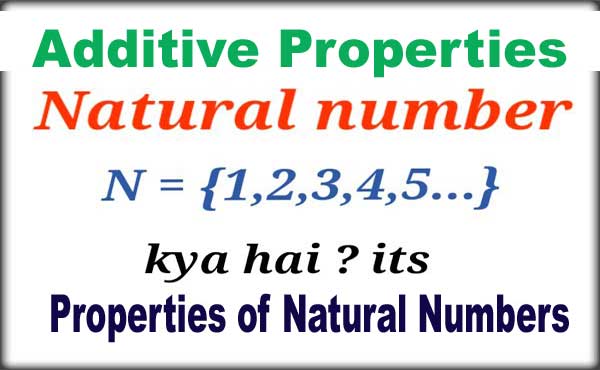Properties of Natural Numbers
Properties of Natural Numbers
1. Additive Properties (Properties due to Addition):
a) Closure Property of Addition: The Set of Natural Numbers is closed with respect to the operation of Addition.
In general, it means that the sum of Natural Numbers is always a Natural Number.
This is known as Closure Property of Addition in the Set of Natural Numbers.
For example 3 and 5 are two Natural Numbers, then 3 + 5 = 8 is also a natural Number.
b) Commutative Law of Addition: If a and b are two Natural Numbers, then
a + b = b + a.
This is known as Commutative Law of Addition in the Set of Natural Numbers.
For example: 3 and 5 are two Natural Numbers, then
3 + 5 = 8
&
5 + 3 = 8
Hence,
it is established that, 3 + 5 = 5 + 3
c) Associative Law of Addition: If a, b and c are three Natural Numbers, then
a + (b + c) = (a + b) + c
This is known as Associative Law of Addition in the Set of Natural Numbers.
For example: 3, 5 and 7 are three Natural Numbers then
3 + (5 + 7) = 3 + 12
= 15
&
(3 + 5) + 7 = 8 + 7
= 15
Hence,
it is established that, 3 + (5 + 7) = (3 + 5) + 7
2. Multiplicative Properties (Properties due to Multiplications):
a) Closure Property of Multiplication:
The Set of Natural Numbers is closed with respect to the operation of Multiplication.
In general, it means that the Product of Natural Numbers is always a Natural Number
This is known as Closure Property of Multiplication in the Set of Natural Numbers.
For example 3 and 5 are two Natural Numbers,
then 3 × 5 = 15 is also a Natural Number.
b) Commutative Law of Multiplication:
If a and b are two Natural Numbers, then
a × b = b × a.
This is known as Commutative Law of Multiplication in the Set of Natural Numbers.
For example: 3 and 5 are two Natural Numbers, then
3 × 5 = 15
&
5 × 3 = 15
Hence, it is established that, 3 × 5 = 5 × 3
c) Associative Law of Multiplication: If a, b and c are three Natural Numbers, the
a × (b × c) = (a × b) × c
This is known as Associative Law of Multiplication in the Set of Natural Numbers.
For example: 3, 5 and 7 are three Natural Numbers then
3 × (5 × 7) = 3 × 35
= 105
&
(3 × 5) × 7 = 15 × 7
= 105
Hence,
it is established that, 3 × (5 × 7) = (3 × 5) × 7
d) Existence of Multiplicative Identity: For every Natural Number a, there exist a Natural Number 1 (one) such that
a × 1 = 1 × a = a
1 (one) is called the Multiplicative Identity in the Set of Natural Numbers
For example: 5 is a Natural Number, then
5 × 1 = 5
&
1 × 5 = 5
Hence, it is established that, 5 × 1 = 1 × 5 = 5
Also Read More
Comparative Study of POINT, LINE, LINE SEGMENT and RAY
Algebraical Formulae/Algebraical Identities
Properties of Natural Numbers
Fast Facts:
1. The Set of Natural Numbers is not closed with respect to the operation of Subtraction. The Difference of two Natural numbers is not always a Natural Number. Illustrate yourself with suitable example.
2. The Set of Natural Numbers is not closed with respect to the operation of Division. The Quotient of two Natural numbers is not always a Natural Number. Illustrate yourself with suitable example.





